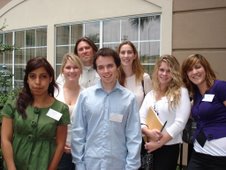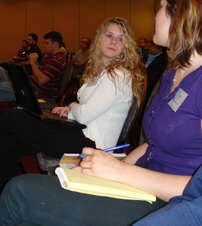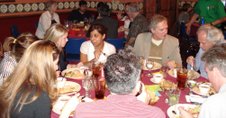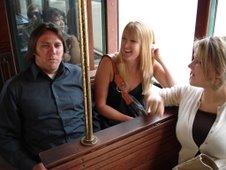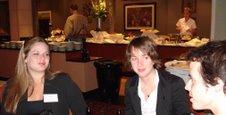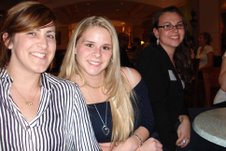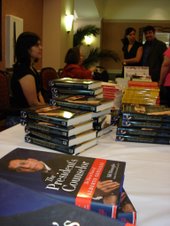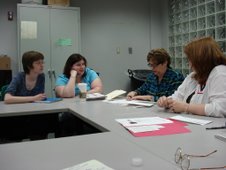 Arguably the most common question in today's news is "Where is journalism going?"
Arguably the most common question in today's news is "Where is journalism going?"This was the topic of the forum to kick-off the National Writers Workshop this morning in the Fiesta Ballroom. Guest speakers included David Ryan of LJworld.com and Tricia Schwennesen, Rich Marini and Hector Saldana of San Antonio Express-News.
Our professor and mentor, Kym Fox, introduced the panel and asked this ultimate question.
Ryan began the discussion, saying at LJWorld.com, based in Lawrence, Kansas, they allow comments on all of their stories. This brings a certain level of involvment to the community. Although this is a fantastic idea in theory, it is not as fruitful with all locations the publication reaches. LJWorld is a publication of World Online. Steamboat Pilot & Today is also a World Online publication for Steamboat Springs, Colorado. The majority of Steamboat Springs' population does not have the usual desk job, and does not allow them the same daily internet access.
"We don't get the level of readership (we hope for)," Ryan said, in reference to the amount of hits to the Web site in Steamboat Springs.
The discussion led to the "hot" topics of blogs v. citizen journalists and comedy is the news.
Blogging has become a way for virtually anyone to become a journalist. During the recent Virginia Tech massacre, students were taking videos of the shootings with their cell phones, uploading to the internet and sending to the news stations.
Bingo.
Where do we, as journalists, place ourseleves in this culture of blogging and online journalism?
Schwennesen said our goal as journalists should be to reach a broader audience. Personally, I agree with that.
A question from an audience member to the panel addressed tailoring your writing to specific audiences.
"A lot of sites allow readers to filter what they want to read," Schwennesen said. "We, as a business, need a good balance between what they want and what we consider useful."
Fox said that her role as an educator is a constant challenge teaching the role of media in democracy.
"(You) want to be a champion of First Amendment rights," Fox said. "How do we manage all that with the continuing responsibility of the press?"
Ryan suggested that on the internet, time virtually does not exist.
"People's lives are hectic," Ryan said. "When do you have time for the news? (Online) news can present itself as they want it when they want it."
On the issue of blogs becoming a major source of information for the general public, Saldana questioned if all the information is good information. This lingering question is a perfect example of the public assuming their information is credible because they "read it on the internet."
Credibility is the key ingredient in honest journalism. Political satirist Jon Stewart brands himself as a non-journalist, yet being credible holds importance to his program. I agree with Saldana when he referred to Stewart as a touchstone. He has become the pattern, or model, of the generally younger audience. Stewart and Colbert speak to an already informed audience. This is how their audience understands the humor in the news.
"Stewart's audience is better informed than Fox News'," Rich Marini said.
Schwennesen said that as a journalist she does not let Stewart's humorist news affect her work.
Fox said the evolution of Jon Stewart has brought more "hard-hitting news." He is a news aggregator, which is someone who collects from multiple sources.
Ryan said he takes Stewart's show for exactly what it is.
"The fool or jester can say more than the average," Ryan said. "Using comedy, satire and sarcasm allows complex communication."
*Roy Peter Clark was scheduled to be the keynote speaker, but was unfortunately unable to attend due to a sudden illness.


